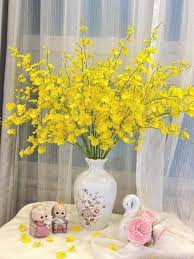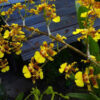# How to Organize a Workshop on Caring for Dancing Lady Orchids (*Oncidium*)

Dancing Lady Orchids, known scientifically as *Oncidium*, are one of the most enchanting groups of orchids, prized for their vibrant flowers and unique shapes resembling dancing figures. Their allure makes them popular among plant enthusiasts, but proper care and knowledge are essential for successful cultivation. Organizing a workshop on caring for Dancing Lady Orchids can foster appreciation for these beautiful plants, empower participants with essential skills, and create a community of orchid lovers. This article outlines a comprehensive guide to organizing a successful workshop, from planning and logistics to educational content and post-event engagement.
## Table of Contents
1. [Understanding the Audience](#understanding-the-audience)
2. [Setting Goals for the Workshop](#setting-goals-for-the-workshop)
3. [Selecting a Suitable Venue](#selecting-a-suitable-venue)
4. [Budgeting for the Workshop](#budgeting-for-the-workshop)
5. [Choosing the Right Date and Time](#choosing-the-right-date-and-time)
6. [Promoting the Workshop](#promoting-the-workshop)
7. [Preparing Educational Materials](#preparing-educational-materials)
8. [Structuring the Workshop Agenda](#structuring-the-workshop-agenda)
9. [Engaging Participants During the Workshop](#engaging-participants-during-the-workshop)
10. [Post-Workshop Activities and Follow-Up](#post-workshop-activities-and-follow-up)
11. [Gathering Feedback](#gathering-feedback)
12. [Conclusion](#conclusion)
—
## 1. Understanding the Audience
Before organizing a workshop, it’s crucial to understand the target audience. The workshop can attract various participants, including:
– **Beginners**: Individuals new to orchid cultivation who seek basic knowledge about plant care.
– **Intermediate Growers**: Gardeners with some experience looking to enhance their skills.
– **Enthusiasts and Collectors**: Individuals passionate about orchids who may want to deepen their understanding of specific varieties, particularly *Oncidium*.
Understanding the audience will guide content development, the complexity of topics, and hands-on activities during the workshop.
## 2. Setting Goals for the Workshop
Establish clear objectives to ensure the workshop meets participants’ needs. Possible goals include:
– **Education**: Providing participants with essential knowledge about caring for Dancing Lady Orchids, including watering, lighting, fertilization, and pest management.
– **Skill Development**: Offering hands-on training in potting, propagation, and maintaining healthy orchids.
– **Community Building**: Creating a supportive environment where participants can share their experiences and connect with fellow orchid enthusiasts.
Having well-defined goals will help shape the workshop’s content and structure.
## 3. Selecting a Suitable Venue
Choosing the right venue is vital for the workshop’s success. Consider the following factors:
– **Space Requirements**: Ensure the venue can accommodate all participants comfortably, with space for demonstrations and hands-on activities.
– **Accessibility**: Choose a location that is easily accessible for attendees, with necessary facilities like restrooms and parking.
– **Environment**: Select a venue with a suitable environment for orchids, such as good lighting and ventilation, if possible.
Common venue options include community centers, botanical gardens, local nurseries, or even private homes with ample space.
## 4. Budgeting for the Workshop
Creating a budget helps manage expenses effectively. Consider the following cost factors:
– **Venue Rental**: Fees for using the space.
– **Materials and Supplies**: Costs for pots, soil, fertilizers, and educational materials.
– **Marketing**: Expenses for promotional materials, including flyers, online ads, or social media promotions.
– **Refreshments**: If providing snacks or drinks, include these costs in the budget.
Be transparent about the budget with potential sponsors or collaborators and explore funding options if necessary.
## 5. Choosing the Right Date and Time
Selecting an appropriate date and time is crucial for maximizing attendance. Consider the following:
– **Avoid Conflicts**: Check local calendars for holidays, events, or other activities that may conflict with the workshop.
– **Audience Availability**: Choose a date and time that suits your target audience, such as weekends or evenings.
– **Seasonal Considerations**: Consider seasonal factors that may affect orchid care or interest, such as spring blooming seasons.
Once a date is selected, communicate it clearly in all promotional materials.
## 6. Promoting the Workshop
Effective promotion is key to attracting participants. Consider various promotional channels:
– **Social Media**: Utilize platforms like Facebook, Instagram, and gardening forums to reach a broader audience. Create engaging posts with images of Dancing Lady Orchids and workshop details.
– **Local Community Boards**: Post flyers at local gardening centers, libraries, community centers, and botanical gardens.
– **Email Newsletters**: If you have a mailing list, send out an announcement detailing the workshop.
– **Collaborations**: Partner with local orchid societies, gardening clubs, or nurseries to promote the event to their members.
Engaging visuals and clear messaging can help generate interest and encourage registration.
## 7. Preparing Educational Materials
Creating educational materials is essential for providing participants with valuable information. Consider the following:
– **Handouts**: Prepare comprehensive handouts that cover workshop topics, including care guides for Dancing Lady Orchids, pest management tips, and propagation methods.
– **Visual Aids**: Use slides, images, or videos to enhance understanding. Visual aids can illustrate various orchid species, care techniques, and common issues.
– **Resource Lists**: Provide participants with a list of resources, including books, websites, and local orchid societies, for further learning.
Well-prepared materials will enhance the learning experience and serve as valuable references for participants.
## 8. Structuring the Workshop Agenda
A well-structured agenda is crucial for keeping the workshop organized and engaging. Consider including the following components:
### 8.1 **Introduction**
– Briefly introduce yourself and your experience with orchids.
– Share the workshop’s objectives and what participants can expect to learn.
### 8.2 **Educational Sessions**
– **Basic Orchid Care**: Cover the essentials of orchid care, including lighting, watering, and humidity requirements for *Oncidium* orchids.
– **Potting and Repotting**: Demonstrate proper potting techniques, soil selection, and how to repot an orchid.
– **Propagation Techniques**: Discuss different methods of propagation, including division and seed germination.
### 8.3 **Hands-On Activities**
– Allow participants to practice potting their own Dancing Lady Orchids under supervision.
– Conduct a propagation session where participants can practice dividing existing plants or working with orchid seeds.
### 8.4 **Q&A Session**
– Allocate time for participants to ask questions, share experiences, and discuss challenges they may face in caring for their orchids.
### 8.5 **Closing Remarks**
– Summarize key takeaways from the workshop and encourage participants to continue learning about orchids.
### 8.6 **Networking Opportunity**
– Provide time for participants to mingle, share their experiences, and network with other orchid enthusiasts.
## 9. Engaging Participants During the Workshop
Engaging participants throughout the workshop can enhance their learning experience and make it more enjoyable. Consider the following strategies:
### 9.1 **Interactive Activities**
– Incorporate interactive activities such as group discussions, quizzes, or games related to orchid care.
### 9.2 **Hands-On Practice**
– Ensure that participants have opportunities to practice potting and propagating orchids, allowing them to apply what they learn.
### 9.3 **Encourage Sharing**
– Create an open environment where participants feel comfortable sharing their experiences, successes, and challenges in orchid care.
### 9.4 **Utilize Technology**
– Use tools like live polls or online Q&A platforms to engage participants and gather feedback in real time.
## 10. Post-Workshop Activities and Follow-Up
Following the workshop, consider implementing the following activities to maintain engagement and support participants:
### 10.1 **Send Thank-You Emails**
– Send personalized thank-you emails to participants, expressing appreciation for their attendance and enthusiasm.
### 10.2 **Share Workshop Materials**
– Distribute digital copies of workshop materials, including handouts and presentation slides, for participants to reference later.
### 10.3 **Create a Community Group**
– Consider establishing a social media group or online forum where participants can connect, share updates, and ask questions about their orchids.
### 10.4 **Plan Future Workshops**
– Encourage participants to share their interest in future workshops, allowing you to gauge topics they may want to explore further.
## 11. Gathering Feedback
Collecting feedback is essential for improving future workshops and understanding participant experiences. Consider the following methods:
### 11.1 **Post-Workshop Surveys**
– Distribute online surveys to gather feedback on various aspects of the workshop, including content, structure, and engagement.
### 11.2 **Open Discussions**
– Allow participants to share their thoughts and suggestions during the networking session or through follow-up communication.
### 11.3 **Review and Reflect**
– Analyze feedback to identify strengths and areas for improvement. Use insights to refine future workshop planning and execution.
## 12. Conclusion
Organizing a workshop on caring for Dancing Lady Orchids can be a rewarding experience, fostering appreciation for these beautiful plants while empowering participants with essential skills. By understanding your audience, setting clear goals, and employing effective educational and communication strategies, you can create an engaging and informative workshop that inspires a community of orchid enthusiasts. With careful planning, preparation, and follow-up, your workshop can leave a lasting impact on participants and enhance their passion for Dancing Lady Orchids.

